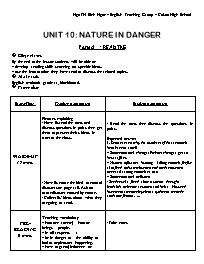Bài soạn môn học Tiếng Anh lớp 11 - Unit 10: Nature in danger - Period: Reading

Objectives
By the end of the lesson students will be able to:
+ develop reading skill: scanning for specific ideas.
+ use the information they have read to discuss the related topics.
Materials
English textbook grade 11, blackboard.
Procedure
Bạn đang xem tài liệu "Bài soạn môn học Tiếng Anh lớp 11 - Unit 10: Nature in danger - Period: Reading", để tải tài liệu gốc về máy bạn click vào nút DOWNLOAD ở trên
UNIT 10: NATURE IN DANGER Period : READING Objectives By the end of the lesson students will be able to: + develop reading skill: scanning for specific ideas. + use the information they have read to discuss the related topics. Materials English textbook grade 11, blackboard. Procedure Stage/Time Teacher’s activities Students’ activities WARM- UP 12 mins Pictures exploiting - Have Ss read the facts and discuss questions in pairs then get them to present theirs ideas in front of the class. - Have Ss name the kind of natural disasters on page 115. Ask for more disaster caused by nature. - Collect Ss’ ideas about what they are going to read. - Read the facts then discuss the questions in pairs. Expected answer 1. Some reasons why the numbers of these animals have become small: + Environmental changes/ habitat changes: green house effect. + Human influence : hunting, killing animals for fur, skin, food, industrialization and modernization process, keeping animals as pets + Environmental pollution - Earth-quake, flood, elnio, tsunami, drought, landslide, volcanic eruption, sinkholes , blizzard, hurricanes, tropical cyclones, typhoons, tornado, epidemic, famine.. PRE-READING 8 mins Teaching vocabulary + humane race (n) = human beings = people. + in all respects = ( + be in danger of = the ability of bad or unpleasant happening. + have (a great) influence on = affect (v) = influence (v). + destroy (v) destruction (n) = damage (n) + interfere (v) : can thiep - Have Ss pronounce these new words correctly. - Take notes - Pronounce these words correctly. WHILE- READING 20 mins Set the scene Task 1: Filling blanks - Instruct Ss to do Task 1. - Get Ss to do Task 1 individually - Tell Ss to peer-check - Call on Ss for their answer and explanation. Task 2: Guessing the topic - Instruct Ss to do Task 2 - Have Ss work individually. Remind Ss to locate the information. - Call on Ss for their answer and explanation Task 3: Answering questions - Guide Ss to answer questions: have a quick look at the questions, elicit the meaning on new words Ss may not know then ask Ss to locate the question and its answer. - Get Ss to do the task individually the check the answers with a peer. - Call on Ss for answers and location of the information. - Listen to the T attentively - Do Task 1 individually - Compare their answers with their partners’ ones. Answer key 1. extinct 2. protect 3. decreasing 4. pollutants 5. endangered 6. interference - Listen carefully - Work individually Answer key 1. C 2. B 3. A 4. C - Pay much attention to what T says - Do the task Answer key 1. Four ways that people change the world are : - They are changing the environment by building cities and villages - They are affecting the water supply by using water for industry and agriculture. - They are changing weather conditions by cutting down trees in the forests. - They are destroying the air by adding pollutants like smoke from factories and fumes from cars. 2. The serious consequences of people’s interference with the environment are: - Many kinds of rare animals are killed. - The environment where these animals are living is badly destroyed. - The numbers of rare animals are decreasing so rapidly that they are in danger of becoming extinct. 3. Many things have been done to protect endangered nature , such as: - Many organizations have been set up and money has been raised to save rare animals. - Thousands of national parks have been established. - Laws have been passed/ introduced to prohibit killing endangered animals. POST-READING 5 mins - Ask Ss to work in groups discuss the question. - Call on Ss to present their talks in front of class. - feed back. Homework - Ask Ss to write a summary about what they have read. - Work in groups and complete the task. - Present their talks.
Tài liệu đính kèm:
 giao an dien tu.doc
giao an dien tu.doc





